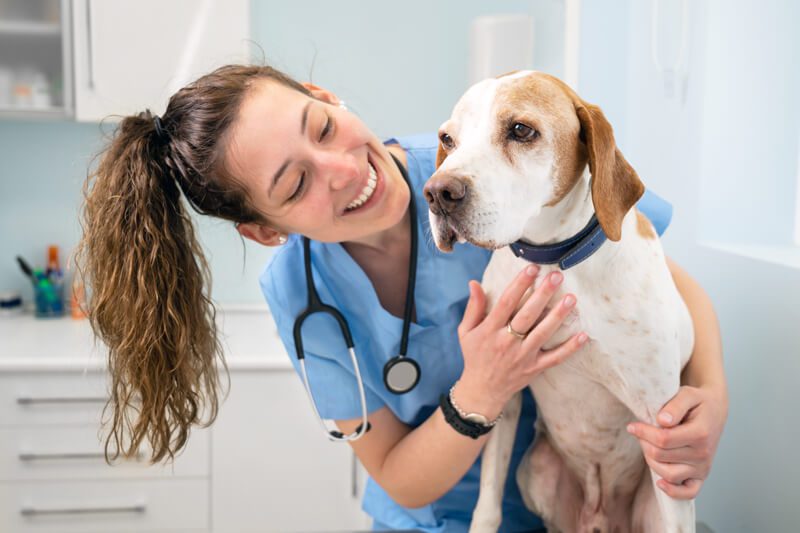How to prepare before your pet’s Pet Cancer Surgery
Wiki Article
Comprehensive Overview to the Solutions Offered by a Vet Oncologist
Veterinary oncology includes a broad variety of services targeted at treating and identifying cancer in pet dogs. Board Certified Veterinary Oncologist. Oncologists use advanced analysis techniques and use various treatment alternatives tailored to every pet's needs. They likewise focus on supportive treatment and give important sources for pet proprietors. Comprehending these solutions is important for making notified choices. What specific elements of vet oncology can significantly affect a pet dog's treatment journey?Comprehending Vet Oncology
Veterinary oncology is a specific area concentrated on detecting and treating cancer cells in pets. This discipline encompasses a variety of strategies, from clinical treatments such as chemotherapy and immunotherapy to surgical interventions focused on eliminating lumps. Vet oncologists are educated to acknowledge the one-of-a-kind indications of cancer cells in numerous species, enabling them to tailor treatment plans to private clients.In enhancement to standard therapies, vet oncology emphasizes encouraging treatment, which plays an essential role in enhancing the quality of life for afflicted pets. This consists of pain administration, nutritional support, and palliative treatment choices. Partnership with family pet owners is important, as they are essential to decision-making regarding their animals' treatment paths. As research advances, vet oncology remains to progress, using brand-new hope and enhanced outcomes for pet dogs detected with cancer. In general, this field is basic for resolving the intricacies of cancer in friend pets.
Advanced Diagnostic Techniques
Advanced diagnostic techniques play an essential duty in veterinary oncology, providing critical understandings into the presence and level of cancer in animals. Imaging methods such as ultrasound, CT scans, and MRI are typically utilized to imagine lumps and examine their qualities. In addition, biopsy procedures are necessary for acquiring tissue examples, permitting clear-cut diagnosis and customized treatment strategies.Imaging Modalities Utilized
Imaging techniques play an important duty in the diagnosis and monitoring of cancer in pets. Vet oncologists use various sophisticated imaging strategies to evaluate lump transition, visibility, and size. Radiography, or X-rays, provides an initial sight of bone and breast problems, while ultrasound supplies real-time imaging of soft tissues, permitting thorough assessment of interior body organs. Computed tomography (CT) boosts visualization of complex anatomical frameworks and makes it possible for 3D reconstructions, helping in specific growth localization. Magnetic vibration imaging (MRI) is important for soft cells distinction, specifically in brain tumors. Furthermore, nuclear medication techniques such as positron emission tomography (ANIMAL) assistance determine metabolic activity within growths. Jointly, these methods boost analysis precision, guiding efficient therapy strategies for oncological patients.Biopsy Procedures Discussed
Complying with the preliminary evaluation via imaging methods, getting a clear-cut medical diagnosis often requires tissue sampling through biopsy treatments. Vet oncologists make use of numerous biopsy strategies based upon the growth's place and attributes. Fine needle goal (FNA) is a minimally invasive method that draws out cells for cytological exam, suitable for superficial masses. Core needle biopsies give bigger tissue samples and serve for deeper growths, enabling histopathological evaluation. Surgical biopsies entail excising a part or the entire tumor, facilitating detailed analysis. These procedures not just validate the existence of cancer yet likewise assist determine its kind and grade, directing therapy decisions. Each biopsy approach is picked very carefully to balance analysis precision with individual safety and convenience.Treatment Options for Cancer in Family pets
When an animal is detected with cancer, a range of therapy options end up being offered to aid improve and manage the illness lifestyle. Veterinary oncologists typically suggest a multidisciplinary strategy tailored to the specific animal's demands, which might include surgical procedure, radiation treatment, immunotherapy, or alternative treatments.Surgical procedure is typically used to remove tumors and afflicted cells, potentially leading to total remission sometimes. Radiation therapy aims to target and ruin cancer cells, lowering tumor size and easing symptoms - Veterinary Oncology Services. Immunotherapy uses the pet's immune system to combat cancer cells better, while alternate therapies may consist of acupuncture or organic supplements to sustain total wellness
Each therapy alternative lugs its very own advantages and risks, and vet oncologists function very closely with pet dog proprietors to make a comprehensive plan that lines up with the animal's particular diagnosis and the proprietor's dreams. The best objective is to boost the pet dog's convenience and high quality of life throughout their cancer journey.
Radiation treatment for Animals
Chemotherapy is a common therapy alternative for family pets identified with cancer and is usually made use of along with various other therapies outlined by vet oncologists. This therapy includes the administration of certain medications created to target and ruin cancer cells, thereby lowering growth size and preventing the spread of the condition. Vet oncologists tailor radiation treatment methods based on the kind of cancer cells, the pet's total wellness, and the desired therapy result.Negative effects can take place, as these drugs might likewise affect healthy and balanced cells. Common responses include nausea or vomiting, vomiting, and temporary changes in hunger - Veterinary Cancer Specialist. Veterinary oncologists are outfitted to manage these adverse effects properly, guaranteeing the pet's comfort throughout the therapy process. Routine surveillance with blood examinations and follow-up visits is crucial to evaluate the pet dog's reaction to radiation treatment and make essential modifications. Inevitably, chemotherapy can offer substantial benefits, enhancing the top quality of life for pets dealing with cancer diagnoses

Radiation Treatment in Veterinary Medication
Radiation treatment works as a reliable treatment alternative for family pets diagnosed with localized tumors, supplying a targeted method to cancer cells administration. This strategy uses high-energy radiation to harm the DNA of cancer cells, hindering their capability to multiply. It is specifically beneficial for growths that are not amenable to surgical elimination or for cases where surgical procedure may not be practical due to the growth's area.Vet oncologists tailor radiation protocols based upon lump type, dimension, and area, as well as the family pet's total health. Therapy can be provided by means of external beam radiation or brachytherapy, each with unique benefits. Typically, several sessions are required to make best use of effectiveness while lessening side results.
Family pets might experience momentary responses such as skin irritability, the total objective is to diminish growths and ease signs and symptoms, inevitably boosting the pet dog's diagnosis and high quality of life. Appropriately, radiation therapy plays a necessary duty in detailed cancer cells treatment.
Palliative Treatment and Lifestyle
Palliative care in veterinary oncology focuses on enhancing the lifestyle for pets encountering incurable health problems, making certain convenience and dignity in their final days. This specialized strategy focuses on pain management, sign control, and emotional support. Vet oncologists examine each family pet's individual demands, customizing Go Here treatments to relieve pain and improve total health.Methods may consist of carrying out medicines for pain alleviation, handling nausea or vomiting, and resolving other distressing signs. In addition, nutritional assistance is frequently provided to keep stamina and boost appetite. The psychological element of palliative treatment is similarly important; developing a calm setting helps in reducing stress and anxiety for both pet dog and owner.
Inevitably, the goal of palliative treatment is to permit family pets to appreciate their staying time with as much pleasure and dignity as possible. By concentrating on convenience and lifestyle, veterinary oncologists play an essential duty in ensuring that animals and their families navigate this tough journey with empathy and understanding.
Assistance for Pet Owners Throughout Therapy

Emotional Support for Owners
Charting the emotional landscape throughout a family pet's cancer treatment can be a frustrating experience company website for owners. The unpredictability bordering diagnosis and diagnosis can bring about sensations of unhappiness, vulnerability, and anxiety. Vet oncologists identify the importance of emotional assistance and often provide support to assist proprietors browse this difficult journey. Communication is necessary; reviewing treatment options and possible outcomes can reduce some concerns. In addition, supplying reassurance that emotional responses are valid fosters an encouraging environment. Numerous oncology clinics may also suggest support groups or counseling solutions customized for pet dog proprietors, promoting common experiences. Urging proprietors to focus on self-care throughout this time is vital, as their emotional well-being straight affects their family pet's convenience and general treatment experience.
Resources and Educational Products
Steering via the intricacies of an animal's cancer therapy can be daunting for owners, making access to dependable sources and academic materials vital. Vet oncologists typically provide a selection of handouts, pamphlets, and online products that describe treatment choices, potential adverse effects, and care methods. These resources assist demystify the procedure and empower pet proprietors to make educated choices. Additionally, several oncology clinics supply access to sustain forums and groups where owners can attach with others facing similar challenges, fostering a sense of area. Educational webinars and workshops carried out by vet experts better enhance understanding, making sure that owners are fully equipped to browse their pet's journey with cancer cells treatment with confidence and understanding.Regularly Asked Questions
How Can I Prepare My Family Pet for a Vet Oncology Go To?
Preparing a family pet for a vet oncology visit involves event clinical documents, keeping in mind signs and symptoms, and making sure the pet dog fits. A calm demeanor and familiar products can assist alleviate anxiousness throughout the appointment.What Are the Signs My Animal May Have Cancer?
Signs that an animal may have cancer include inexplicable weight management, relentless throwing up or diarrhea, unusual lumps or swellings, lethargy, changes in appetite, difficulty breathing, and alterations in behavior. Prompt vet interest is crucial.Just How Can I Assistance My Family Pet Mentally During Treatment?
Supporting a pet psychologically during therapy entails giving weblink convenience, keeping regimens, using gentle affection, and ensuring a tranquil atmosphere. Participating in quiet play and regular friendship assists minimize tension and fosters a complacency.Exist Alternate Therapies for Pet Dogs With Cancer cells?
Alternative treatments for family pets with cancer consist of acupuncture, herbal therapies, and nutritional assistance. These techniques may enhance traditional treatments, advertising overall wellness. Consulting with a veterinarian is crucial for risk-free and effective assimilation of alternate treatments.What Costs Should I Expect for Veterinary Oncology Providers?
The anticipated expenses for veterinary oncology solutions can differ significantly, frequently influenced by diagnostics, therapies, and ongoing treatment. Pet proprietors should get ready for expenses ranging from appointments to specialized therapies, mirroring the complexity of cancer cells monitoring.Partnership with pet dog owners is vital, as they are essential to decision-making regarding their pet dogs' treatment paths. Each therapy choice carries its own advantages and dangers, and vet oncologists work closely with pet owners to design a detailed plan that straightens with the family pet's certain medical diagnosis and the proprietor's desires. Pets might experience momentary responses such as skin inflammation, the general purpose is to reduce tumors and minimize symptoms, ultimately enhancing the family pet's diagnosis and top quality of life. Assistance for pet owners during treatment is crucial in guiding via the psychological obstacles linked with a pet's cancer diagnosis. Preparing an animal for a veterinary oncology check out includes event medical records, noting symptoms, and ensuring the pet is comfortable.
Report this wiki page